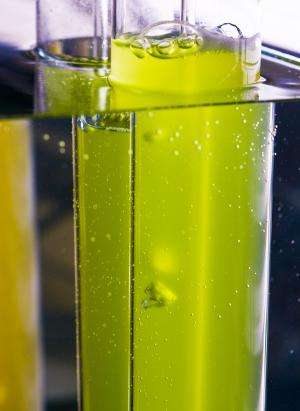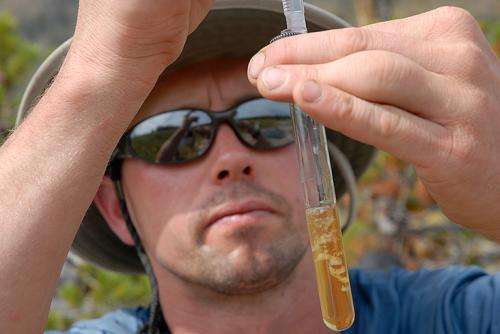MSU research into algal biofuels propels larger study

(Phys.org) —There is a lab in the engineering complex at Montana State University where grow lights stay on night and day, even during the winter holiday season, nurturing various bubbling containers of bright green algae. The room is at the heart of a broad research effort to shed light on a possible renewable energy source of the future.
Robin Gerlach is the MSU professor coordinating research into the production of oil-producing algae, as well the feasibility of commercial-scale biofuel production based on microbes discovered in Yellowstone National Park. Part of a multi-institutional project funded by a grant through the Sustainable Energy Pathways program at the National Science Foundation, it is one of many algal biofuel research projects at MSU in the labs of MSU professors Keith Cooksey, Matthew Fields, Brent Peyton and Gerlach.
The project, which also includes the University of North Carolina and the University of Toledo, is part of a federal effort to tackle some of the fundamental problems in developing enough biofuels fuels to provide up to 50 percent of the nation's transportation fuel. The U.S. Department of Energy funding the project.
"The project takes the groundbreaking work MSU scientists have done on algal biofuels and begins to integrate some of the bigger questions about what this promising technology will look like if it is going to become a major source of sustainable energy," Gerlach said.
One promising line of research involves alkalinity-loving microbes from Yellowstone's hot springs, as well as from Washington's Soap Lake – soap is one common household product that is highly alkaline.

Key to the success of algal biofuels is getting the algae to produce lots of oil, or lipid, that can be converted into biodiesel and other fuels. To produce lots of lipid, algae have to consume a lot of carbon – in this case, bicarbonate, the same stuff found in baking soda.
Typically, people think algae consume carbon dioxide but under alkaline conditions, most of the inorganic carbon in the water is in the form of bicarbonate, Gerlach said.
"But in these highly alkaline environments, that carbon becomes soluble in water and it can be used," said Gerlach, whose research team includes post-doctoral students, graduate students and undergraduates.
Algal biofuels are receiving so much attention because they have potential where other biofuels face limits, Gerlach added. Crop biofuel can compete with food production for land and fertilizer. Algal biofuels don't face that problem. The oils produced by these alkalinity-loving microbes could also be turned into other products, such as nutritional supplements.
Additionally, the fact that these microbes thrive in a highly alkaline environment lessens the contamination that can complicate efforts to extract commercially viable oils.
The work at the University of North Carolina is taking a holistic look at the future of algal biofuels. That portion of the project is being conducted by Gregory Characklis, who grew up in Bozeman and is the son of the late Bill Characklis, the MSU professor who founded the Center for Biofilm Engineering.
Characklis, a professor in UNC's Department of Environmental Sciences and Engineering, is compiling data to build computer models that will test the economic feasibility of producing algal biofuels on a commercial scale, while also assessing some of the environmental impacts of the production process.
While Characklis and Gerlach acknowledge that there will be a trade offs, such as higher production costs, there are advantages algal biofuels have over other energy products – they are renewable and can be produced without the harsh chemicals used in making petroleum products.
"It's not to say that there aren't challenges associated with algal biofuels. But when we look closely at a system we'd need to scale up to the level of providing 50 percent of the nation's transportation fuels, there seem to be fewer fatal flaws than those associated with many other biofuels," Characklis said.
Provided by Montana State University


















